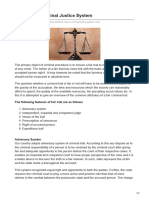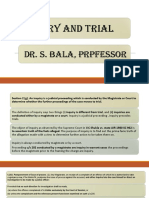Section 319 Section 302
Section 319 Section 302
Uploaded by
Vidit HarsulkarCopyright:
Available Formats
Section 319 Section 302
Section 319 Section 302
Uploaded by
Vidit HarsulkarOriginal Description:
Original Title
Copyright
Available Formats
Share this document
Did you find this document useful?
Is this content inappropriate?
Copyright:
Available Formats
Section 319 Section 302
Section 319 Section 302
Uploaded by
Vidit HarsulkarCopyright:
Available Formats
Nallakananu @ Muthu alone was committed to the Court of Sessions
Problem: The learned Sessions Judge was neither called upon to exercise nor suo motu
exercised his jurisdiction in terms of Section 319 of the Code of Criminal Procedure. Nallakannu
@ Muthu alone in the aforementioned situation was tried and convicted for commission of the
said offence under Section 302 of the IPC and was sentenced to undergo rigorous imprisonment
for life.
Appeal by muthu
High Court
According to the High Court, the action on the part of the investigating officers, viz., PW-17 and
PW-18 leaving out the names of Popular Muthiah and Murugan from the array of accused was
not a bona fide error.
The High Court furthermore noticed that the mandatory provisions of Section 173 (2)(i) had not
been complied with insofar as the first informant was not intimated by the Investigating Officer
that Murugan and Popular Muthiah were not to be chargesheeted.
The High Court also felt that the District Judge ought to have conducted himself fairly in the
matter of exercising his jurisdiction under Section 319 of the Code of Criminal Procedure.
Issues:
Whether the High Court while exercising its appellate jurisdiction under Section 374(2) read
with Section 386 of the Code of Criminal Procedure could direct further investigation of the case
against the persons whom the High Court felt should have been included in the challan on the
basis of the materials on record available before the appellate court?
The High Court, however, was not correct in issuing a direction to the State to take advice of the
State Public Prosecutor as to under what section the Appellant has to be charged and tried or
directing the CB, CID to take up the matter and re-investigate and prosecute the Appellant
herein. Such a power does not come within the purview of Section 482 of the Code of Criminal
Procedure. Investigation of an offence is a statutory power of the police. The State in its
discretion may get the investigation done by any agency unless there exists an extraordinary
situation.
You might also like
- Fair Trial in Criminal Justice SystemDocument5 pagesFair Trial in Criminal Justice Systemreranov591No ratings yet
- 319 Add AccusedDocument4 pages319 Add Accusedsaleem syedNo ratings yet
- Criminal Justice System in India Complimentary Roles of Courts and The Police PDFDocument13 pagesCriminal Justice System in India Complimentary Roles of Courts and The Police PDFSounak VermaNo ratings yet
- Criminal Trial Important PointsDocument28 pagesCriminal Trial Important Pointsradiant3086No ratings yet
- CRPC 319rameshwar-And-Another-V-State-Of-Up-And-Another-Criminal-Revision-No-2173-Of-2022-Allahbad-High-Court-421649-421833Document23 pagesCRPC 319rameshwar-And-Another-V-State-Of-Up-And-Another-Criminal-Revision-No-2173-Of-2022-Allahbad-High-Court-421649-421833vishaldhingra555No ratings yet
- Priti AgarwallaDocument6 pagesPriti AgarwallautkarshspiritNo ratings yet
- Case Analysis AjDocument4 pagesCase Analysis Ajanon_868458840No ratings yet
- Role of Magistrate in InvestigationDocument13 pagesRole of Magistrate in InvestigationPragati ChaturvediNo ratings yet
- InvestigationDocument3 pagesInvestigationluffyxsenku1512No ratings yet
- Ayush 09 PSDA CrpcDocument51 pagesAyush 09 PSDA Crpcayushsharma22803No ratings yet
- Answers of CRPC PYQsDocument15 pagesAnswers of CRPC PYQsVivek VibhushanNo ratings yet
- Sakiri Vasu Related ProjectDocument12 pagesSakiri Vasu Related ProjectJatin PahujaNo ratings yet
- Drafting Pleading ConveyanceDocument23 pagesDrafting Pleading Conveyancesuparna garaiNo ratings yet
- Criminal Procedure Code - CRPC NotesDocument58 pagesCriminal Procedure Code - CRPC NotesMudit Gupta100% (7)
- Judicial Group - Paper - I - TextDocument33 pagesJudicial Group - Paper - I - TextMIbraheemWaseerNo ratings yet
- Hira Vs StateDocument6 pagesHira Vs StateSatyendra ChauhanNo ratings yet
- 47 47 2004 Case LawDocument8 pages47 47 2004 Case LawPrasadNo ratings yet
- Prahlad Singh Bhati Vs N.C.T., Delhi & Anr On 23 March, 2001Document4 pagesPrahlad Singh Bhati Vs N.C.T., Delhi & Anr On 23 March, 2001mohdansad433No ratings yet
- Case SummaryDocument10 pagesCase SummaryShreya ModiNo ratings yet
- 384 DismissalDocument3 pages384 DismissalPRERANA JOSHI 205B002No ratings yet
- CRPC Crash Course LLBDocument63 pagesCRPC Crash Course LLBRahul parasar100% (1)
- Sec 482 CR.P.C Reads As FollowsDocument5 pagesSec 482 CR.P.C Reads As FollowsNitesh Kumar LaadlaNo ratings yet
- Inquiry & TrialDocument12 pagesInquiry & TrialPrerna JhaNo ratings yet
- Criminal Procedure Code - CRPC Notes - LawOrdoDocument54 pagesCriminal Procedure Code - CRPC Notes - LawOrdoJay PalleNo ratings yet
- DR. SUBHASH KASHINATH MAHAJAN v. THE STATE OF MAHARASHTRADocument15 pagesDR. SUBHASH KASHINATH MAHAJAN v. THE STATE OF MAHARASHTRAEswar StarkNo ratings yet
- 2018 - 33 - 1502 - 23731 - Judgement - 31-Aug-2020 Regarding The Informant Cannot Be The InvestigatorDocument62 pages2018 - 33 - 1502 - 23731 - Judgement - 31-Aug-2020 Regarding The Informant Cannot Be The InvestigatorminabazarNo ratings yet
- Criminal Procedure Code - CRPC NotesDocument48 pagesCriminal Procedure Code - CRPC NotesRASHMI KANSALNo ratings yet
- Criminal Procedure Notes 2Document66 pagesCriminal Procedure Notes 2Rengie Galo100% (2)
- Sl. No. S.173, Code of Criminal Procedure Bench Streng TH 11. When A Report Forwarded by The Police To The MagistrateDocument9 pagesSl. No. S.173, Code of Criminal Procedure Bench Streng TH 11. When A Report Forwarded by The Police To The MagistrateAbhishek SharmaNo ratings yet
- Crime Investigation and Court Directives in IndiaDocument35 pagesCrime Investigation and Court Directives in IndiaabctandonNo ratings yet
- Drafting, Pleading and Conveyancing, Mod-3Document6 pagesDrafting, Pleading and Conveyancing, Mod-3kinkini1007No ratings yet
- CRPC NotesDocument51 pagesCRPC Notessarayu alluNo ratings yet
- Research NoteDocument4 pagesResearch Notemariakhan200131No ratings yet
- A482 (A) 17349 2023Document2 pagesA482 (A) 17349 2023arlexassociatesofficeNo ratings yet
- Criminal Law Word SheetDocument27 pagesCriminal Law Word Sheetnishka.peaceNo ratings yet
- Section 340 CRPCDocument2 pagesSection 340 CRPCdevanshsrivastav65No ratings yet
- Filing Incomplete Chargesheet Without Completing Investigation Would Not Extinguish The Right of Accused To Get Default Bail - Supreme CourtDocument6 pagesFiling Incomplete Chargesheet Without Completing Investigation Would Not Extinguish The Right of Accused To Get Default Bail - Supreme CourtAmitDwivediNo ratings yet
- Uc 0133 2024Document7 pagesUc 0133 2024chauhanjitendra199No ratings yet
- Jaykumar Vs Central Narcotics Bureau Mandsaur MadhMP2022010722164219206COM474712Document7 pagesJaykumar Vs Central Narcotics Bureau Mandsaur MadhMP2022010722164219206COM474712Geetansh AgarwalNo ratings yet
- Admin - Judgement - File - Judgement - PDF - 2024 - Volume 6 - Part I - 2024 - 6 - 129-163 - 1718255792Document35 pagesAdmin - Judgement - File - Judgement - PDF - 2024 - Volume 6 - Part I - 2024 - 6 - 129-163 - 1718255792jaiswalsukoonNo ratings yet
- JaspreetDocument5 pagesJaspreetJaspreet SinghSno. 34No ratings yet
- CRPC Answer StructureDocument17 pagesCRPC Answer StructureManas UpadhyayNo ratings yet
- Acknowledgement: (Affiliated To Jnvu, Jodhpur) Ba - LLB 6 SemesterDocument12 pagesAcknowledgement: (Affiliated To Jnvu, Jodhpur) Ba - LLB 6 SemesterKrishan SambhwaniNo ratings yet
- 50 Constitution Judgment 2Document50 pages50 Constitution Judgment 2vishpdfreaddataNo ratings yet
- Assignment - 5 LegalviseDocument6 pagesAssignment - 5 LegalviseArpita PriyadarshiniNo ratings yet
- Criminal Procedure Code NotesDocument68 pagesCriminal Procedure Code NotesMudit Gupta100% (3)
- Vinay Tyagi Vs Irshad Ali and Ors 13122012 SCs120941COM56358Document25 pagesVinay Tyagi Vs Irshad Ali and Ors 13122012 SCs120941COM56358Roshni NathwaniNo ratings yet
- PDF Upload 387100Document16 pagesPDF Upload 387100Madhusudan AloneyNo ratings yet
- 18bbl091 (VINUBHAI JUDGMENT)Document4 pages18bbl091 (VINUBHAI JUDGMENT)deepanshu jainNo ratings yet
- Criminal Procedure Code - CRPC NotesDocument65 pagesCriminal Procedure Code - CRPC NotesSirajum Munira100% (4)
- Criminal Procedure CodeDocument8 pagesCriminal Procedure CodeRINA RAMNo ratings yet
- D024 Nikitarathi CRPCDocument19 pagesD024 Nikitarathi CRPCnutzzNo ratings yet
- Dismissal of Complaint Under CRPC - IpleadersDocument21 pagesDismissal of Complaint Under CRPC - IpleadersBandana SaikiaNo ratings yet
- CR PCDocument34 pagesCR PCNarsing RaoNo ratings yet
- 6Document2 pages6Mordhwaj TiwariNo ratings yet
- Can an offence be compounded in the absence of a complainantDocument3 pagesCan an offence be compounded in the absence of a complainanthimanshiNo ratings yet
- CRPC Q-ADocument43 pagesCRPC Q-ARohit GargNo ratings yet
- BNSS InternalDocument14 pagesBNSS InternalMiss SinghaniyaNo ratings yet
- Stirring Mind ICODocument2 pagesStirring Mind ICOVidit HarsulkarNo ratings yet
- IPR II FD (Manjusha Tiwari)Document8 pagesIPR II FD (Manjusha Tiwari)Vidit HarsulkarNo ratings yet
- Env Law SynopsisDocument7 pagesEnv Law SynopsisVidit HarsulkarNo ratings yet
- Niveditha First DraftDocument20 pagesNiveditha First DraftVidit HarsulkarNo ratings yet
- Labour Law AbstractDocument2 pagesLabour Law AbstractVidit Harsulkar100% (1)
- Mortgage in Property LawDocument23 pagesMortgage in Property LawVidit HarsulkarNo ratings yet
- Vidit TOPA First DraftDocument11 pagesVidit TOPA First DraftVidit HarsulkarNo ratings yet
- Maharashtra National Law University, Mumbai: Human Rights LAW Impact of Globalisation On Human RightsDocument8 pagesMaharashtra National Law University, Mumbai: Human Rights LAW Impact of Globalisation On Human RightsVidit HarsulkarNo ratings yet
- Maharashtra National Law University, Mumbai: International Labour LawsDocument6 pagesMaharashtra National Law University, Mumbai: International Labour LawsVidit HarsulkarNo ratings yet
- E L P P: Topic: Critique of Pozzoli Case (Inventive Step Test) and Comparision With Indian LawDocument8 pagesE L P P: Topic: Critique of Pozzoli Case (Inventive Step Test) and Comparision With Indian LawVidit HarsulkarNo ratings yet
- Legal Implications of Compulsory Licensing On Pharmaceutical Sector in India in Light of Natco v. BayerDocument66 pagesLegal Implications of Compulsory Licensing On Pharmaceutical Sector in India in Light of Natco v. BayerVidit HarsulkarNo ratings yet
- Party No 1 - Universal Explosives Party No 2 - Explotech SolutionsDocument1 pageParty No 1 - Universal Explosives Party No 2 - Explotech SolutionsVidit HarsulkarNo ratings yet
- Think Like A LawyerDocument7 pagesThink Like A LawyerVidit HarsulkarNo ratings yet
- Nearly 8 Years Later The Number of Subprime Auto Loans Sinking Into Delinquency Hit Their Highest Level Since 2010 in The Third QuarterDocument3 pagesNearly 8 Years Later The Number of Subprime Auto Loans Sinking Into Delinquency Hit Their Highest Level Since 2010 in The Third QuarterVidit HarsulkarNo ratings yet
- CAS ApurvaDocument18 pagesCAS ApurvaVidit HarsulkarNo ratings yet










































































